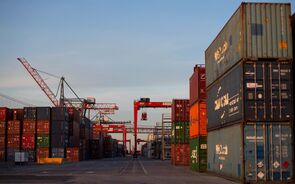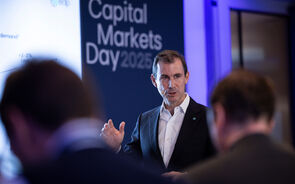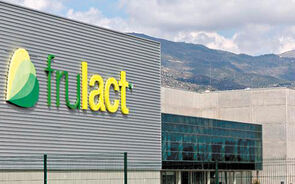Collin Powell
1 Mensagem
|Página 1 de 1
Collin Powell
UNITED NATIONS (CNN) -- U.S. Secretary of State Colin Powell told the U.N. Security Council Wednesday that Iraq had made "no effort" to disarm in what could be a pivotal moment in the showdown with Iraq over its alleged violation of U.N. resolutions concerning weapons of mass destruction.
• Powell began by playing audiotapes of what he said were Iraqi officials discussing an upcoming inspection by U.N. officials.
"They are inspecting ammunition you have... for the possibility there are forbidden ammo," said a voice Powell identified as an Iraqi official. "We sent you a message yesterday to clean out the areas, scrap areas, abandoned areas, make sure there is nothing there."
Powell called the recordings "part and parcel of a policy of evasion and deception that goes back 12 years."
"I cannot tell you everything that we know. But what I can share with you, when combined with what all of us have learned over the years, is deeply troubling," Powell said.
• Powell also showed a satellite photograph of what he said was an active chemical weapons bunker.
He said the photograph showed Iraqi officials cleaning out the bunkers ahead of another inspection. Other photographs showed caravans of trucks at other suspected chemical weapons and ballistic missile sites just two days before inspections resumed.
• Powell said that the United States has learned through human intelligence sources that Saddam Hussein warned Iraqi scientists that there would be "serious consequences" to them and their families if they provide sensitive information to inspectors and that scientists were forced to sign documents that said they understood that divulging information was punishable by death.
One U.S. official said that the information Powell is presenting will be costly because it will reveal some sources of intelligence, but he added, "What good is intelligence if you don't use it." He said there were several last-minute decisions not to release some material because of concern for the safety of U.S. troops.
CIA Director George Tenet sat behind Powell at the horseshoe-shaped Security Council table. A senior State Department official said Tenet's presence was "part of the credibility of the whole package" -- a "personal endorsement" of Powell's message.
At the other end of the table, Mohammed Aldouri, Iraq's ambassador to the United Nations, listened to Powell's presentation and waited for his chance to respond. Aldouri is expected to give a speech, but only after the 15 members of the Security Council have addressed the world body. (Interactive:Member nations' positions on Iraq)
Twelve foreign ministers were also present for the meeting in the most anticipated live television presentation there since the 1962 Cuban missile crisis. U.N. officials said there will be more television feeds than usual, with one camera dedicated to Powell and another for his presentation items.
After Powell speaks, each member nation then will be allowed to speak for six to eight minutes apiece. U.N. Secretary-General Kofi Annan and the two chief U.N. weapons inspectors, Hans Blix and Mohammed ElBaradei, also attended but are not expected to speak. (Interactive: Speakers following Powell)
The Bush administration has not committed to seeking a second Security Council resolution on Iraq. But the goal after Powell's presentation is to gauge support for a new resolution that would:
• Declare that Iraq failed to keep its commitment to honor Security Council Resolution 1441 and set a deadline for Iraqi compliance;
• Give the U.N. blessing for military action if the deadline passes.
President Bush met with Democratic and Republican congressional leaders Wednesday morning to discuss Powell's presentation. (Full story)
British Prime Minister Tony Blair also reiterated the stance supported by the United States and Britain while answering questions from the House of Commons.
"I believe our case on weapons of mass destruction is very, very clear indeed. It's perfectly obvious Saddam has them," Blair said. "The U.N. has asked him to give them up. He is not giving them up at the moment.
"Unless the United Nations does actually ensure that its will be upheld, then the damage will be done not just to world security but to the U.N. itself."
In an interview aired Tuesday, Saddam claimed he has no weapons of mass destruction or ties to al Qaeda. (Full story)
CNN.com's Iraq Tracker has further developments in the standoff with Iraq.
CNN Senior White House Correspondent John King and National Security Correspondent David Ensor contributed to this report.
• Powell began by playing audiotapes of what he said were Iraqi officials discussing an upcoming inspection by U.N. officials.
"They are inspecting ammunition you have... for the possibility there are forbidden ammo," said a voice Powell identified as an Iraqi official. "We sent you a message yesterday to clean out the areas, scrap areas, abandoned areas, make sure there is nothing there."
Powell called the recordings "part and parcel of a policy of evasion and deception that goes back 12 years."
"I cannot tell you everything that we know. But what I can share with you, when combined with what all of us have learned over the years, is deeply troubling," Powell said.
• Powell also showed a satellite photograph of what he said was an active chemical weapons bunker.
He said the photograph showed Iraqi officials cleaning out the bunkers ahead of another inspection. Other photographs showed caravans of trucks at other suspected chemical weapons and ballistic missile sites just two days before inspections resumed.
• Powell said that the United States has learned through human intelligence sources that Saddam Hussein warned Iraqi scientists that there would be "serious consequences" to them and their families if they provide sensitive information to inspectors and that scientists were forced to sign documents that said they understood that divulging information was punishable by death.
One U.S. official said that the information Powell is presenting will be costly because it will reveal some sources of intelligence, but he added, "What good is intelligence if you don't use it." He said there were several last-minute decisions not to release some material because of concern for the safety of U.S. troops.
CIA Director George Tenet sat behind Powell at the horseshoe-shaped Security Council table. A senior State Department official said Tenet's presence was "part of the credibility of the whole package" -- a "personal endorsement" of Powell's message.
At the other end of the table, Mohammed Aldouri, Iraq's ambassador to the United Nations, listened to Powell's presentation and waited for his chance to respond. Aldouri is expected to give a speech, but only after the 15 members of the Security Council have addressed the world body. (Interactive:Member nations' positions on Iraq)
Twelve foreign ministers were also present for the meeting in the most anticipated live television presentation there since the 1962 Cuban missile crisis. U.N. officials said there will be more television feeds than usual, with one camera dedicated to Powell and another for his presentation items.
After Powell speaks, each member nation then will be allowed to speak for six to eight minutes apiece. U.N. Secretary-General Kofi Annan and the two chief U.N. weapons inspectors, Hans Blix and Mohammed ElBaradei, also attended but are not expected to speak. (Interactive: Speakers following Powell)
The Bush administration has not committed to seeking a second Security Council resolution on Iraq. But the goal after Powell's presentation is to gauge support for a new resolution that would:
• Declare that Iraq failed to keep its commitment to honor Security Council Resolution 1441 and set a deadline for Iraqi compliance;
• Give the U.N. blessing for military action if the deadline passes.
President Bush met with Democratic and Republican congressional leaders Wednesday morning to discuss Powell's presentation. (Full story)
British Prime Minister Tony Blair also reiterated the stance supported by the United States and Britain while answering questions from the House of Commons.
"I believe our case on weapons of mass destruction is very, very clear indeed. It's perfectly obvious Saddam has them," Blair said. "The U.N. has asked him to give them up. He is not giving them up at the moment.
"Unless the United Nations does actually ensure that its will be upheld, then the damage will be done not just to world security but to the U.N. itself."
In an interview aired Tuesday, Saddam claimed he has no weapons of mass destruction or ties to al Qaeda. (Full story)
CNN.com's Iraq Tracker has further developments in the standoff with Iraq.
CNN Senior White House Correspondent John King and National Security Correspondent David Ensor contributed to this report.
1 Mensagem
|Página 1 de 1
Quem está ligado:
Utilizadores a ver este Fórum: As_paus , latbal, m-m, malakas, Mavericks7, MR32, nunorpsilva, O Magriço, PAULOJOAO, PMP69, SerCyc, Shift72, Simplório, trilhos2006 e 108 visitantes


